Theatre Reviews
THE 'IT'S NOT FAIR!' - Rhema Theatre Company
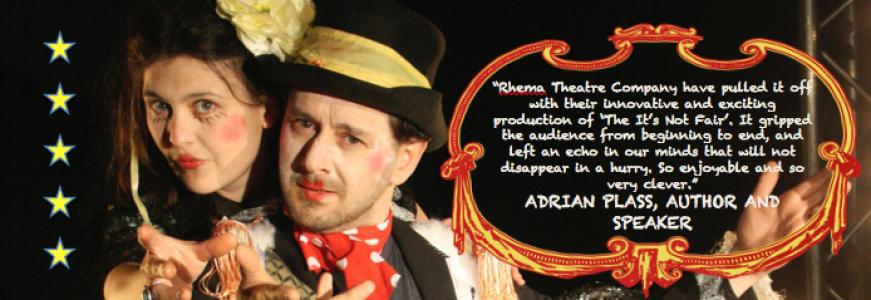
The ‘It’s Not Fair’ is a stark and unsettling examination of one of the greatest humanitarian issues of our time, as performed by Michael and Rebecca Peacock. The pair use music, clowning and puppetry to tell four very different stories of human trafficking. They go from old-fashioned Punch and Judy-esque joking (“Before tonight, I hadn’t spoken to my wife in years – I couldn’t get a word in edgeways”) to suddenly embodying the roles of slaves and the criminals who trick, imprison, sell and use them for menial labour and the sex industry.
There is a real intimacy in the performance, and this is not lost even in the spacious Buxton Methodist Church. The frequent costume changes and technical requirements of the performance were clearly demanding, but the pair never let the intensity drop, and there is always something interesting to look at and think about onstage. The puppetry of a boy in an Indian labour camp was brilliant and sensitive, and the use of screens to gradually hem characters in was subtle and clever.
They carry an important message about the often neglected realities of slavery today
It was hugely informative; I was particularly surprised both by the forced labour camps in India, which are essentially modern concentration camps, and the existence of slavery in England, especially London. The ages of many girls forced to work in brothels in places like the Philippines is also thoroughly disturbing. Despite the obviously grim subject matter, there is ultimately an uplifting message as the duo explain what is being done to combat the issue internationally and how to make a difference yourself. It certainly had the right effect on me, as I left feeling moved and inspired to explore the matter further.
Rufus McAlister
ACTING ALONE - Ava Hunt Theatre
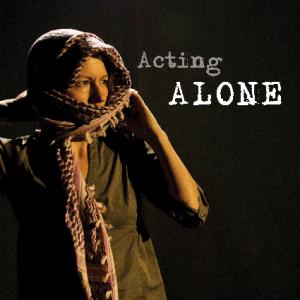
Acting Alone is an ambitious and provoking project undertaken by Ava Hunt. Indeed, it is both a work of theatre and a project in challenging its audiences to not view the conflict between Israel and Palestine as beyond help and not our problem. Inspired by her own work in the West Bank, Hunt takes on a number of roles (and accents), fluidly transitioning from herself to a Palestinian soldier to an Israeli soldier from Birmingham to a knowledgeable Australian. It is sometimes funny, often moving, and engaging throughout. She initially asks whether she is qualified to talk about her subject, but by channelling the many voices that she has come across she is able to create not so much a story as a stark tapestry of the situation.
The show is not just confined to events in the West Bank, however. Hunt tells anecdotes from her life which create a more personal feel, and lights a match when telling apocryphal tales which expose our own loss of morals and standards when dealing with foreign issues. One of the most poignant moments was her comparison of heroes, one a nurse saving Jewish children in the Holocaust, another an outraged young writer and activist crushed when trying to stop an Israeli bulldozer. She argued that there was a commonality in their heroism, and wished that Israeli children could be shown a play where a character says ‘we are all made of carbon’, which would help them view Palestinian children as the same. The audience is used for minor interactions, she passes round schoolchildren’s drawings and has members create a rectangle with string in which she stands. The mechanics of theatre are used for her to ask whether we should be a sedate audience or stand up and become performers for what we believe is right, regardless of the cost. Whilst the show won’t start a revolution, it is the kind of thing that can help shape our moral and social fabric to approach the West Bank with hope.
Rufus McAlister
AFTER PARTY - Re:Sound
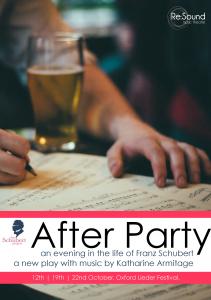
Well, it was for one night only, so I’m afraid you have missed one of the best shows of the Fringe. Innovative, exciting, daring, intelligent and beautiful are all words that come to mind when I think about how to describe it. It was hugely original and inventive; the play went between operatic performances of Schubert’s work, scenes from his life and interactive games with the audience as if we were also in the tavern. The scene where two aspects of Schubert’s consciousness converse about love, death and music was very bold and clever. Indeed, the entire script was clever, as we took a hectic journey through the hectic mind of a genius; there was not the order that Schubert’s father would have wanted, but our minds, like Schubert’s, were constantly turned from the harsh realities of life to sumptuous music to bawdy games. The transitions from music to scenes of Schubert’s life, although sudden, were wonderfully conceived and confidently performed. The play was a delight, full of varied roles and ideas about music and art, love, genius, death and oppression.
The performers were four outrageously talented individuals. All excellent actors, taking on both comedic and more sensitive aspects to each role, their performances were elevated to the sublime with their musical ability. All had stunning voices as they performed extracts from Schubert’s Lieder, and they all went through a variety of instruments, playing the piano, harp and French horn. The ability to go from performing the beautiful music with incredible craft to performing a range of characters and emotions was superb. It was a real privilege to watch such talented performers who clearly have bright futures in the music and theatre industry. What else can I say? Only that if you didn’t see it, I’m sorry – this was a truly flawless production.
Rufus McAlister
AROUND THE WORLD IN 80 DAYS - Curious Grin Productions

Jules Vernes epic yarn about a Victorian adventurer setting out to circumnavigate the world in 80 days has long been a favourite of readers, and indeed of Fringe audiences, who have seen a number of adaptations in recent years. This production, however is something a bit special, a fizzing cauldron of invention, energy, humour and fun from the members of Oxford University Drama Society. With just a simple (but ingenious) set and a host of everyday props that can be employed in numerous clever ways, Jules Verne’s story is brought to life in a completely fresh, albeit occasionally joyfully idiosyncratic and anachronistic way.
The cast of eight, playing a huge number of characters work impeccably as a team. Amongst them, as the hero, Phileas Fogg, Peter Sayer is all buttoned-up precision, a man out to prove his scientific point, rather than to win his massive gamble. As Fix, the detective in pursuit of him, Luke Rollason has a nicely understated comedy, breaking the fourth wall with a gentle touch. In a number of smaller roles as well as providing dextrous guitar accompaniment, Madeleine Walker brings energy and sparkle. But the star of the show (apart from the elephant!) is Ellie Wade as Fogg’s manservant, Passepartout, a role played with a brio, with such bright-eyed joie de vivre (as well as with such an outrageous accent) by this talented actor. It’s a standout performance that reminded me of the young Miranda Richardson in Blackadder, throwing everything at the audience, without ever tipping it over.
Director Helena Jackson and her cast have breathed life into this classic tale in an entirely modern way. Catch it while you can.
Robbie Carnegie
AS YOU LIKE IT - Butterfly

Butterfly are back for another year with their always popular Shakespeare underground. For this year’s Fringe they bring “As You Like It” to Poole’s Cavern, turning the cave into the Forest of Arden Festival, following Rosalind and Celia on their quest for love. This modern day interpretation of the text really brings out the humour in one of Shakespeare’s best loved plays. The script has been pared down to just the main plot of Rosalind and Orlando’s love story, while pursued by Phoebe and Silvius, to make the performance an hour long. This was probably a very good decision – the cave is really cold. On that note, bring a coat, and flat shoes.
The actors have a fantastic energy through the show, dashing through the cavern, improvising little lines and quirks which makes each performance special. They use the cave to their full advantage, perhaps a challenging performance space, but they take it in their stride, climbing up rocks, and mud banks (which is a little nerve wracking at times).
Music is used throughout the show to create the festival atmosphere, all of the actors either playing instruments, or singing and dancing – which the audience is very much invited to join in. Music is used to begin and end performances, and for a couple of scene changes, and it turns out the dancing makes for an excellent way to stay warm underground. The music works wonderfully with the cave acoustics, although due to the echo occasionally a few spoken words are lost, when spoken a little too fast or too loud.
None the less, the plot is very easy to follow, even without having to understand the nuances of Shakespeare’s language. The characterisation is strong through the play, and the actors go out of their way to be as bold and brash with each personality as they can.
Butterfly has created a very fun, flirty play, suitable for all ages. An understanding of Shakespeare is not necessary (something warm, however, very much is). This is a beautiful piece of theatre, in a fantastic setting. The play travels through the cave, with each scene in a different chamber. Butterfly are always a Fringe Favourite, and for good reason.
Ariane Dean
THE ASH GIRL by Timberlake Wertenbaker - REC Youth Theatre Company

The Ash Girl is a dark retelling of the classic fairytale Cinderella, told with a backdrop of a world shrouded in monstrosity –literally. We see Ash Girl (Ashie), played by Robyn Edgar, struggle through the torment of her step sisters, the pressure of growing up that all three girls receive from her step-mother, and the constant persuasion of Sadness attempting to end her life. A spark of hope comes in the form of the fairy whose survival relies on Ashie believing in herself, who sends her to the ball where she falls for the foreign Prince. But that isn’t the end of it...
Initially, I was apprehensive about this play being a condensed version given that it is typically two hours long. However, I did also have high expectations as REC Youth Theatre Company are Fringe regulars whose performances are often well received. Given this, I was impressed by most of it but disappointed by facets.
The smaller cast of nine did an incredible job with such a challenging script. Timberlake Wertenbaker does not shy away from strong characters and they accomplished this however, at times the actors seem to be drowning under the pressure of delivering a Wertenbaker text.
This does not apply to everyone. Ellie Burke was not the lead character, but she was the one that consistently commanded the stage. The air in which she presented her characters was controlled and mesmerising, and for a teenager to assert herself as not one, but two strong characters is an incredible achievement, particularly when professionalism was definitely lacking from certain cast members. Robyn Edgar also deserves individual praise. Her beautiful portrayal of Ash Girl creates an empathetic audience thanks to her wonderfully realistic characterisation of a downtrodden girl looking for a glimmer of hope. Another standout was James Chetwood. His stupendous articulation and energy every time he came onto the stage was incredible, even when he barely spoke as Boymouse; and the scenes with him and Burke as Amir and Zehra respectively were electrifying.
In spite of the individual mentions, the company shone as an ensemble, working well together to create an entertaining production. Diction was lost in places and the all important ‘no backs to the audience’ rule was forgotten at times, but these are minor in the grand scheme of what is an impressive show.
Director, Kitty Randle has created an incredible production. How the cast have managed to utilise the multi-rolling, the minimalist costuming, and set restrictions is a credit to her. Whilst it isn’t the best production at the Fringe, it is definitely not one to miss.
Jessica Millott
BEHIND THE BLINDS - Dreamshed Theatre
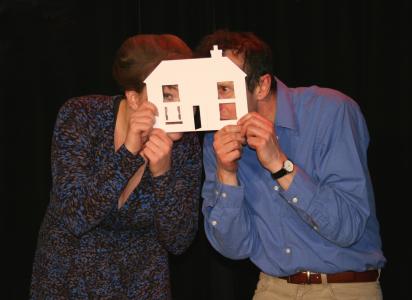
United Reform Church Wednesday 22 July 2015
An evening round at number 59 is both appealing and repellent. Richard and Isabelle have invited us, the new neighbours, round to theirs to welcome us to the neighbourhood and proceed to regale us with songs about the other residents in the street. ‘It’s what we do, write songs about what we think they get up to!’
Appealing because it feeds into each of our ‘need to know’ all the gossip about those we live amongst. Repellent because the songs are not always kind and what will their song about us be?
As we walk down the street we get a glimpse and insight ‘behind the blinds’ and also into the dynamic of the relationship of Richard and Isabelle. The singing and playing of this talented duo bring to life this cast of curiosities. I was genuinely moved, as I think Isabelle was, at the memory box song; cringing at the cloying relationship between Kevin and his mother Mary and amazed at the goings on at number 51!!!
This was good fun with lots of interaction with the audience. Humour, pathos and down right bitchiness coupled with clever lyrics and great performances made this an enjoyable hour spent in the lounge of our new neighbours.
Well done, thoroughly enjoyed.
Linda McAlinden
A CREAM CRACKER UNDER THE SETTEE by Alan Bennett - library theatre touring company

After studying this at school I was familiar with the story and really looking forward to seeing this performed live. Probably the best known of Alan Bennett’s ‘Talking Heads’ series, this is a monologue.
For those unfamiliar with the story, it features an elderly lady named Doris who has had a fall at home. She recounts stories of her life, which are both funny and sad. The venue, although small, seems appropriate for the story, as it allows the audience to feel part of Doris’ situation. The simple but clever use of lighting reflects the passage of time in which Doris recounts her memories. Again, although the set was simple it represented the starkness of Doris’ story.
Deborah Kelly’s performance was extremely impressive and captivating. She managed to deliver the comedic style whilst also conveying the repressed emotion of the monologue. Throughout, she drew the audience into Doris’ life, making it a thought-provoking experience. What was even more impressive was that Deborah Kelly carried the whole 35 minute performance on her own without fault.
This was the first of four performances and I couldn’t recommend it highly enough if you are looking for a well written and fantastically performed story. It is on again on the 17th, 18th and 25th July, 7.30pm at the United Reformed Church green room.
Rachel Cooper
�
DEPARTURE LOUNGE - Sudden Impulse Theatre Company

Sudden Impulse Theatre Company returns to the Fringe with two acclaimed productions, Jim Cartwright’s Two, and by way of complete contrast this witty, tender musical by Dougal Irvine focusing on four lads waiting in an airport departure lounge in Spain following an Inbetweeners-style sun and sangria holiday to mark the end of their school days.
Their utterly convincing, foul-mouthed laddishness may put off some audience members at first but Irvine’s clever writing allows us to look behind the façade to their insecurities as they stand in the departure lounge of their lives. JB (Sam Asbury), the leader of the pack, is very conscious of the fragility of their current situation: “This, my friends, is who we really are… right here right now”, fearing that university is going to turn them into “educated tossers who don’t know bollocks”, but as we spend more time with them we realise that not only do they not know each other very well but their individual sense of identity is very much in flux. In one particularly poignant song, JB shares with the audience his feelings for posh boy Ross (Thom Udall): “You are like the brother I never had”, while Ross reveals to us that the oafish, patronising JB is one friend he would happily ditch: “You’re like my mother – you drive me mad!”
Irvine’s writing, both hilarious and thought-provoking with strong character delineation, is one reason behind this show’s success, but another is the gusto that all the performers, including Sophie, the woman behind all their fantasies, bring to the production. In the Spanish-style heat of the Paupers Pit, they really did give it their all and then some. Laura McElvenny, who plays Sophie, turns out to be behind the choreography too and this works extremely well with the actors using all the stage and the airport chairs to great effect without their actions ever seeming forced.
There are a lot of memorable, well-sung songs and individually the cast had strong voices though I did feel that there were some tuning issues in some of their harmonies. Ultimately though, this did not spoil my enjoyment of what was a thoroughly involving, tightly directed musical performed with great commitment and joie de vivre backed up by some rather fine guitar playing from the sombrero-ed, on-stage guitarists.
Stephanie Billen
FOLLOW/UNFOLLOW - ShinyNewTheatre/LanternTheatre

The question, which I would like to pose you with, is do you watch You Tubers or Vloggers? My answer to that question yes I do. You may also be wondering what is a You Tuber or Vlogger? Well a You Tuber is basically someone talking in front of the camera about his or her hobbies, life etc. A Vlogger is a You Tuber. They are called Vlogger’s because they create videos on what they are doing throughout the day. You Tubers have become a part of our digital dominated society. They are everywhere. Literally everywhere!
Ryan Marten (Jay Podmore) and Chloe Lawson (Lily Shepherd) prove this. Well what is their story? Ryan is a modestly successful You Tuber with 400,000 something subscribers but his channel is going down hill due according to manager Dee Sinclair (Leanne Martin) and ex ‘Rino’ Chloe by the selling of merchandise. Chloe tweets about the exploitation of young fans by Ryan. Dee sees these tweets and is inspired that a teenager can see through the exploitation. Dee hacks into Ryan’s account and tells the ‘Rinos’ to follow Chloe in the hope that her voice will be heard. Rino’s see that Chloe is not a fan of Ryan’s recent videos and start Cyber bullying her. Ryan learns he has been hacked by Dee but is furious at what she has done to Chloe. Chloe then stands up to the bullies. Dee is impressed with her strength of character. They decide to meet and it’s a slippery slope from then onwards!
The narrative of Follow/Unfollow was engaging; light hearted and relatable, making it an enjoyable watch. For me my favourite part of Follow/Unfollow was the characters individual journeys and the subtext that came with them. Although all three characters were extremely different in personalities and ideals, it was interesting to see when fame turns one’s head how quickly a personality can change and they appear to lose sight of their original aim. The narrative in unison with the characters sends a thought-provoking message to the audience- are their beloved You Tubers on camera actually who they really are? This message calls into question not only the You Tubers themselves but also we as an audience as just like the You Tubers posting Videos online we message and talk online perhaps in a completely different persona to our real personalities. Towards the end of the play we see role reversal take place, which shows the audience how false and real some of these people can be.
The visuals on-stage were another strong point of the production occupying the left, right and the middle of the stage. These visuals were of ‘Rino fans’ expressing their thoughts and feelings about Ryan’s videos and Chloe’s situation. The fans videos helped move the narrative along and were funny to watch, as lots of the fans are relatable with their excitement for new content. The visuals made you feel like that it was not a play you were watching but part of real life.
This production is a must see as it shows all aspects of a You Tuber-fan’s world that we may inhabit for a portion of our own life!
Phoebe Alderson
G&D - Tattyband

G&D presents a highly unique and haunting tale between good and evil. Shown through a production with two actors, playing both God and Satan, this play is the antithesis of how both personas are stereotypically portrayed. A highly recommended watch due to acknowledging modern issues, whilst still leaping back to the classic tales in the Old Testament - rather juxtaposing ideas - however accomplished perfectly.
Both actors had remarkable chemistry between them, with both characters having many layers, that the actors peeled off. Satan was a hugely fragmented character, evoking sorrow to vulgarity in a split second. Credit to the actor for executing such a well-known character in a new light. The actor’s performances were beautifully executed, handling dark storylines with ease and sensitivity. Also breaking scenes up with outstanding live singing offered a chance at a little comedy, whilst being clever due to each song being carefully collected to fit the message and mood of the play. The character of God was seen as a woman – atypical of how God is usually perceived, it wasn’t clear at the start why God was perceived in this gender; however it became a pivotal role in the plays twists and turns. The actor used expletives effortlessly, surprising both myself and the audience – proven through many gasps around the room
Staging and simple motifs were cleverly presented. The lighting exhibited the theme of good and evil perfectly, allowing it to set the tone of the play – in which both characters had multiple shifts in personality. Motifs such as wine, signified temptation – leading to later disbeliefs. The climatic twist in the second part of the play will leave you at the end of your seat- leaving you speechless.
This production offers modern twists weaved with classical themes, rendering a dark, mysterious and effortless play; which will leave you laughing in places whilst shocked in others.
Lois Rushworth
�
THE GHOSTHUNTERS' CLUB - Cul-de-sac theatre
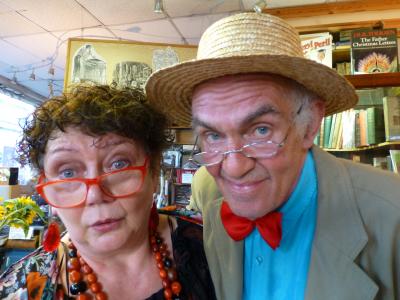
I was very fortunate to attend the Ghosthunters’ Club at Scrivener’s Bookshop on July 14th devised by Terry Naylor and Miranda Midlane. It was a play with a difference, the audience being very much part of the action.
At the start Professor Tony Stoney Middleton (Terry Naylor) introduced himself and his assistant Miss Pringle (Angela Hulme). Before we set on our ghost hunts around Scrivener’s Bookshop we were given protection from ghosts by adopting pseudonyms such as Corbar Eckington. We were also given pieces of ectoplasm for further protection.
The shop is an ideal venue for ghostly experiences with its old books, spooky attics and its dark cellar. The professor led the hunt with his assistant adding comments both humorous and spine chilling. As we proceeded we were involved in numerous activities designed to stir up ghosts. A particular spine tingling part was the reading of a ghost story which related to ethereal goings on in the bookshop. Things became too much for Miss Pringle who went into an uncontrollable hysterical fit and gave the actress time to move into the role of the ghost Edith who lives in the cellar.
The play was enhanced by the character of the Booklady (Janet Hopley), a librarian who is slowly metamorphosing into a book and Annie B Lynn (Catherine Serjeant) who lost her head.
All the audience of 9 had a marvellous experience with the excellent acting and the creative use of the space in the bookshop and I would guess that many members of the audience will be inspired to visit the bookshop at a later date.
Roger Horvath
HALF THE SKY - Void Productions & Mighty Limey

United Reformed Church 17th July
This was a late entry to this year's Fringe Festival and so didn't make it into the printed programme and a three hour show on a busy Friday night was always going to struggle to get a big audience. However the small audience was rewarded by a thoughtful and well-crafted production.
Half the Sky is a series of six monologues delivered by six different women interspersed with songs and music. The production comes from a company in Liverpool - and that matters, but more on that later. The production flyer says: "from small moments in the lives of six very different women... Fate. Belief. Happiness. All your questions answered." Though I suppose this last part to be tongue in cheek.
We first meet a woman who recalls an accident that triggers a series of events that prove not to be happy and she reflects on how we recast events, suggesting that 'fate' played a part. The second character is a young working-class woman who supposes her life to be of no interest until she recalls her dreams in which she learned to fly. Next we meet a woman who is looking for love; she hopes that she will meet someone like the star of a 1950s musical. She knows that she is a romantic - but is the real world too cynical?
Another young woman but university educated this time is excited about meeting a Blues hero only to find that all is not as it seems. The fifth woman reflects on how only once had she been truly happy - when swimming in (or is it "on"?) Rhodes. This unavoidably recalled Shirley Valentine - not necessarily a bad thing. Last of all we meet God - a young woman in ripped jeans with a rucksack. She isn't what we suppose, of course, and is a bit fed up with what we have done to her creation. Stop blaming others; take some responsibility seems to be her message.
The songs are a mixture of original and covers - She Loves You and a tribute to Blues legend Robert Johnson. These are performed with some tenderness and delicacy by Reid Anderson (guitar and piano) and Stephanie E Kearley (cello). The actors were: Claryn Scott, Natalie Timmins, Emma J Hind, Mairi-Claire Kennedy, Lisa Symonds and Chloe Sweetman. All were strong though on occasion their voices were lost in the generous space of the Church.
Ian Salmon was the writer and Anna Cardus the director. The language - its rhythms and cadences - could come from no other English city and this sense of place gave coherence to what might otherwise have seemed fragmented.
This was just the third performance of Half the Sky and the first outside Liverpool. It would be a pleasure to welcome the company back to Buxton.
Helen White
HATS OFF TO LAUREL AND HARDY - Lucky Dog Theatre Productions
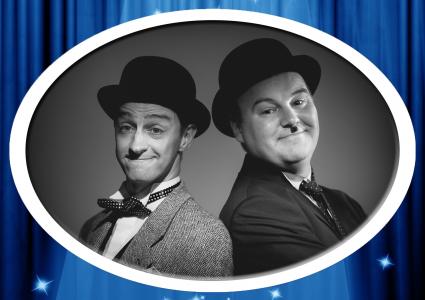
Hilarious and touching, Hats Off strikes the balance between comedy and tragedy superbly; if you want a laugh a minute and a tear every other, this is the show for you. Tony Carpenter and Philip Hutchinson portray the legendary comedy duo brilliantly and the chemistry between them is evident from the word go.
Carpenter and Hutchinson compliment each other on stage immensely, with Carpenter’s endearing portrayal of the daft Stan Laurel bouncing off Hutchinson’s straight but witty Oliver Hardy.
The mixture of performance and video clips gave the show an interesting dimension, making it unique and all the more engaging. The duo’s performance of legendary Laurel and Hardy sketches - both live and on screen - perfectly captured the close relationship and hilarious camaraderie of the phenomenal double act.
The enclosed area in which the play was performed created an intimate atmosphere and allowed the audience to really connect with the characters, adding more to both the comic and sombre aspects of the piece.
I can’t speak for all audience members - as I was far too engaged with the action on stage to take notice of those around me- but I shed a tear or two at various points in the performance.
To sum it up: go and see this show.
Hats off to Carpenter and Hutchinson.
By Sarah Lowes
HIS LETTERS - Dreamshed Theatre

This is a review from the 2014 Fringe
His Letters is an excellent example of story telling that explores family relationships and how we interact with people once they are gone. It strengths were in “how” the story was told rather than “what” story was being told. How the story was told is down to a combination of both the actor and the writing.
To begin with I was drawn in to the solo performance with the captivating performance of John Martin Stevens he transformed between the different characters with ease. Each person was clearly distinguished from his character’s mother, father and the next-door neighbour. Not only that Stevens managed to portray both the humour and depth of sorrow within the writing, some of which I think would have been missed by a less accomplished actor.
The writing carefully balanced the performance between narrative story telling, character thoughts and present time action. Each thread helped the audience to visual the world within which Stevens’ character rediscovered his parents by giving the audience small snapshots of them falling in love during the war and also what moments of what happened in their “happily ever after”.
Between the acting and writing the only other aspect I want to highlight is the use of songs that help to the audience to place the story within the correct time period but also give the story time to breathe. This musical punctuation accented Stevens’s performance and gave me space to appreciate what I had just seen.
Despite finding “what” story, or rather what the outcome of the story, being told a little obvious, overall the His Letters is a reminiscent, warm, story delivered with love and dedication. I enjoyed watching the tale be told and would urge festival goers to head to the United Reform Church over the next couple of weeks and see this for yourself. It was a lovely way to start of my fringe season, however take a coat, as the room is a little chilly!
Toni Saxton
I AM BEAST - Sparkle And Dark

What happens when the wildest parts of our imagination take control? This is the question that Sparkle and Dark are asking the audience in their new piece I am Beast. This question takes us on a thrilling journey filled with heroes and monsters.
I am Beast is an outstanding piece of theatre from start to finish. All credit to Louise Ashton the writer and to director Shelly Knowles-Dixon.
The mood was set from the start with Laurence Illsley playing live music as the audience entered. His music became the soundtrack of the piece, punctuating scenes, adding depth and urgency.
The show took place in the two worlds that exist for Ellie; magnificently played by Lizzie Muncey. One world was bright, harsh and real where words are so difficult to find and the other neon and glass where super heroes fight super villains and good and justice prevail and no one really gets hurt…usually. Into Ellie’s life came a third uninvited dimension, one she had no control over, The Beast. Who is he? What does Ellie see when she looks into the darkness? As an actor she truly captured the anger and the vulnerability of this teenager. Her emotions were raw and dark with guilt eating at her very heart.
The puppetry was captivating, The Beast moved like an animal, head first, sniffing out danger and weakness. The Beast was the dark side, he could do the things Ellie couldn’t, he could make her do more than she believed she was capable of. He was a dream, an idea but in corporal form, a scarred mutated body menacingly voiced by Nick Halliwell.
Gilbert Taylor, as Dad/Oblivion, Louisa Ashton as Annabelle/Yolanda and Nick Halliwell as The Beast all had their individual roles, however they worked as a slick ensemble flicking seamlessly between characters and objects in Ellie’s fast moving imagination. Every character was well defined and memorable, every object crystal clear in its purpose. Their use of physical theatre was incredibly skilful, from the beautifully choreographed fight sequences, to the fast action running scenes.
The design of the set was simple yet adaptable. Moving between the stark cold family house with a flick of a neon light switch to Ellie’s other world. Clever use of lighting by Claire Childs highlighted a news reporter and a Mayor; it signalled to the audience the worlds of fantasy and reality. The only light that travelled between the two areas was torch light, which was used in countless number of creative ways!
I think this is a show that everyone should see. I have never seen a piece of theatre that deals with the anguish of losing someone you love so truthfully. It captures perfectly the pain and guilt of a girl who does not know how to accept her loss and is staring into the darkness. ‘When most people look into the darkness they see the light, when you look into the darkness you see me.’ I cannot recommend this highly enough.
Jayne Marling
JACQUES BREL: UNE VIE A MILLE TEMPS - Far West Theatre

In a wonderful collision of venue and show, the delightfully renovated Green Man Gallery played host to this charming musical celebrating the life of Belgian chansonnier Jacques Brel. Written by Simon Pennicott, who also plays Brel himself, the show takes you through the life of this seminal figure, as told by his daughter, France, played by Filipa Bragança. The narrative is punctuated by a great selection of Brel classics, some well known, some less so, but all appropriate to the stages of Brel’s life they illustrate. Most of the songs appear in their English translations, apart from Ne me quitte pas (If you go away) and Brel’s idiosyncratic translation of The Impossible Dream from the musical Man of La Mancha. It was also a revelation to hear the literal translation of the lyrics of the song we generally know as Seasons as the Sun, aggressive, proud, far from the sentimental words immortalised by Terry Jacks and Westlife!
Pennicott doesn’t attempt a Brel impersonation, and is a slightly British take on the great man, but gradually he begins to inhabit more and more the swagger of this supremely confident stage performer, both bombastic and vulnerable by turns. Bragança is a sensitive, focussed narrator, as well as a singer who brings something genuinely Gallic to the songs that she sings excellently. Occasionally the acoustics and a sometimes all-conquering backing track made some of the lyrics indistinct, but this does not take away from a superb, heart-warming show that provides a welcome reminder of a unique talent.
Robbie Carnegie
JIM MACCOOL’S PARLIAMENT OF FOWLS - Performance Poetry Society

Jim MacCool’s Parliament of Fowls is an ambitious achievement. Taking Chaucer’s poem set on Valentine’s Day about a dream about a female bird’s freedom to choose a lover, or indeed not to choose one, MacCool has ‘translated’ it into contemporary dialogue, with modern words and idioms, and reads it to an attentive audiencee. Medieval poetry such as this was meant to be performed, but the Middle English pronunciation and lexis would make this a tall order for a modern audience. MacCool succeeds in updating the language, however, whilst not losing the richness of the meaning and double-meaning of the original. What was most impressive was his ability to keep the tone of the original, with his trademark wit maintained throughout, and the rhyming and metrical patterns adhered to. The result is a more accessible Chaucer, as well as further highlighting the great poet’s timeless humour and sensitivity to issues that are still hotly discussed today, such as gender politics.
Dressed all in white, and surrounded by paintings on the walls in the Buxton Museum and Art Gallery, MacCool appeared himself to be from a dream vision. His energy and enthusiasm remained unbridled throughout the performance, as if he himself were one of the sexually excited male birds in the Parliament of Fowls. Indeed, whenever he reached the word ‘lust’, he would bark it with such vigour that you felt he did not need the microphone standing in front of him. The performance was ended with the soothing sound of Vaughan Williams, which, combined with the reading of the poem and the aesthetic beauty of the room we were in, made it feel like a sumptuous treat. MacCool is clearly very passionate about poetry, and his work on The Parliament of Fowls must have been arduous, but it certainly pays off, as both Chaucer veterans and those new to the poem seemed impressed. All audience members were given a copy of his version of the poem, as well as a collection of lyrics he has written: it is refreshing to see someone so enthralled by the majesty and continued importance of poetry.
Rufus McAlister
KING LEAR (ALONE) - inamoment theatre company

King Lear (Alone) is an ambitious take on one of Shakespeare’s most famous plays. Starting in the middle and working out, the scenes seem to be in a chaotic order, mirroring the chaos of both the original play and the set, which is littered with scrunched up paper and large, black boxes. Goneril and Regan are pre-recorded voices, the Fool is a clown puppet, Cordelia is a doll, hanging from a bare tree. There are even lines given to a new character, Imogen, Lear’s dead wife, an absent character in the original play who is only hinted at. Characters are often physically formed onstage by the black boxes, which also work as set, as if these characters are obstacles rather than people in Lear’s life. The play itself is a mixture of Shakespeare’s words, and, increasingly as it goes on, Frank Bramwell’s, as Lear stops addressing the other characters and tells the audience just how he feels. This Lear is more self-conscious than we might expect; more acutely aware of his loneliness, more conscious of his hubristic outburst at Cordelia, more contently accepting of death. With sinister music and sounds interrupting him, this is an adaptation as grimly foreboding as the original.
Bob Young, as Lear, gave a strong and nuanced performance, particularly given that he had to stand in late for the original actor, who is unavailable due to illness. He clearly had a good understanding of both script and character, and even though he was alone on stage, the audience was not distracted by his script in hand. Being alone contributes to the nihilism, as well as the sense that Lear may be solely responsible for his tragic downfall. Cordelia and the Fool are mere puppets in the chain of events that he has triggered. Although sometimes lacking the subtlety of the great original, King Lear (Alone) gives the audience much to think about, with rich symbolism in an engaging interpretation. �
Rufus McAlister
THE LIFE AND CRIMES OF REVEREND RACCOON - sheepishproductions@rocketmail.com

This afternoon I was held hostage in the Old Clubhouse by a wanted conman in a white suit and rock star wig. The Reverend (once a swindler, now an accredited man of God), was delivering perhaps his final sermon to the 'average' people of Buxton, before moving on to escape the hands of justice. During his 'enlightening' spiel, I was praised for choosing the baked potato - reflecting a true and righteous path. This is the wonderful, bizarre world of Reverend Eli Leroy Raccoon.
Gareth Watkins weaves tales of faith, intrigue and deceit in this funny and surprisingly moving piece of one-man theatre. The audience was treated to stories of the reverend's life, leading up to his religious experience with the Namibian 'Zealous Simon,' and then with Mary (but not that one). Thus begins his life as a Reverend: "preaching, praying, shouting and healing" (the last being the trickiest bit).
Although there were technical issues with projected images, these were more than made up for by Watkins' confident performance. The character portrayed is, although surreal, very believable, especially when we learn of his true identity, and of the reason behind his unwavering faith.
This wacky, brilliantly inventive production proves that it is well worth venturing out of Underground Venues once in a while for unexpected theatre and comedy delights. Catch the remaining shows on 12th July (5pm), 13th, 23rd and 24th July (7pm), at the Old Clubhouse.
Annie Osborne
LIFE'S WITNESS - From the Mill Theatre Company

As the performers of Life’s Witness marched around the stage, sitting down and then shifting positions as music played, I was worried that it would be an overly ambitious concept piece. I needn’t have had any worries at all; this is a production of the highest quality. An original piece of writing, this is intelligent and disarmingly powerful theatre, and deserves a fuller audience in the pleasant setting of the United Reformed Church.
The story itself is simple, not over-ambitious, but it is beautifully written; heartfelt and poignant. A critically acclaimed author, Nathan, is being interviewed, and gradually he is exposed for both the mistreatment of his younger lover, a history student, and his own lack of originality. We see flashbacks of his life, and understand the pressures that his publicist and critics put him under, as well as his own sense of failure. The links between the interview and scenes from Nathan’s life were clever and fluid, each character written with real sensitivity. Even the interviewer, who gradually shifts from pleasant TV personality to purgatorial guilt confronting Nathan, was written with a degree of subtlety. Nathan himself, in less capable hands, would gradually be exposed to be totally unlovable; a fraud with no redeemable virtues. This was not allowed to happen, however, and he was, even in all his wrongs, pitiable as a man who had lost everything in trying to prove his worth.
The acting was excellent and assured all round, but Dean Bramall was outstanding as Lee, the wronged history student. He had an understated charisma, and played my favourite scene brilliantly, where he meets Nathan for the first time by accident. The awkward flirtatious conversation was so well observed that, even being aware of the tragedy to come, I wanted to smile at the encounter. Indeed, I often found myself smiling at the very quality of this production, and left quite moved. Nathan wishes he could write a quality novel, unlike his spy thrillers. If only he could have written something as good as Life’s Witness, we might have avoided some events of this beautiful tragedy.
Rufus McAlister
LIGHTSPEED by Clem Haran - Organised Chaos Productions

Clem Haran’s debut dramatic play, Lightspeed, depicts the relationship of couple Charlie and Emma but in reverse order. Beginning with the end it takes us through to their first meeting, teaching us more about themselves, their relationship, and what it was that caused the previous scene.
The audience are constantly guessing, and the short scenes keep the play engaging. The writing is beautifully realistic, entwining both high angst and witty remarks to showcase both the turmoil and endearing moments of a relationship. Admittedly it does take a while to get in to, but only because the story is difficult to understand until more information is revealed. But once you do, it is theatre at its best.
Taran Knight and Francesca Heraghty-Smith play Charlie and Emma beautifully. The couple work well together, both utilising their character’s individual back-stories to cause intense conflict, keeping the audience fully engaged with the story. This said, it seemed to take a couple of scenes for the actors to get into it – toward the end they were utterly captivating to watch.
Heraghy-Smith did amazingly well at showing the backward progression of her character, starting with a more negative emotional female worried about commitment, slowly merging into a more naively juvenile girl as their relationship rewinds to the beginning. Knight too was impressive as Charlie but this change of character was not as noticeable, which potentially made Smith overshadow her stage partner. The chemistry between these actors though was mesmerising and watchable; a realistic performance of a couple and their relationship.
The story is simple; it is the journey of a couple’s relationship and it is the simplicity that makes this play so remarkable. The set design is minimalistic; clothes rails that are used for onstage costume changes, and a centre stage bench on a patch of grass. The minimalism adds to the stylistic directorial choices; a prominent one being singular words hanging from the coat hangers that encourages the audience to notice the most important aspect of the scene in motion.
The only deficiency of this production would be the silence of the onstage costume changes. As a stylised choice it is great, and the removal of clothing to be thrown on the bench offers a formidible physical representation of the obstacles this couple has had to overcome, however it is done in silence. Although silence is a great mechanism in theatre, the scene was then introduced with a sound effect, and music heightened individual aspects. This choice of sound effect mars the silence making it unnecessary. My personal opinion is that this silence needs some form of sound as to not initially ruin the effect of the opening scene. As the play progressed this issue became less obvious, however that initial silence caused a separation that felt jarring and uncomfortable.
Lightspeed is implicitly beautiful and deserves to have sold out performances. It is extremely rare to leave the theatre smiling after watching a play you know is about the breakdown of a relationship. Because it is in reverse order, the moment that stays with you is the sweet awkwardness of the start of a relationship; hoping that the reunion you see that start of ultimately has a happy outcome. Finally, if I had to describe Lightspeed in one word, it would be: Magical.
Jessica Millott
LIZZY BENNET REMEMBERS - Little Red Hen Theatre

Although I am slightly biased, because I love ‘Pride and Prejudice’ and still clap when Darcy and Lizzie get together at the end, I thoroughly enjoyed this performance and am certain that even those who haven’t read the book or are not familiar with the story would as well. As with most adaptations knowledge of the original work does help as then you can truly appreciate the fantastic writing that went into this performance.
It was extremely well-written; Prudence Edwards managed to capture perfectly the language of the era and anyone watching the play who has read Austen would notice how Austen-like the writing sounded. Good writing alone, however, does not make a performance fantastic; but coupled with Prudence’s acting skills it made for a great one woman show. Often there is a negative stigma around one man/woman plays but this performance proved them wrong. Prudence navigated the different aspects of the play by keeping one tone reserved for the narrative and then varied her tone in other parts to portray her emotions. The most impressive, in my opinion, was during dialogue with other characters where Prudence switched effortlessly between the voice of Lizzie and those of others; she altered her voice differently for each character that was speaking and even changed her mannerisms and posture. In scenes of recounted dialogue this really helped engage the audience and make them feel as if the action was taking place at that very moment. This was also accentuated by Prudence often acting out Lizzie’s movement in pieces of dialogue or events. On a very superficial level, Prudence’s own resemblance through costume and way of speaking to my favourite Lizzie from ‘Pride and Prejudice’, Jennifer Ehle, made the play all the more enjoyable.
There was one notable absence from the course of events depicted, which was Darcy walking dripping out of a pond, but without Colin Firth in a white shirt on hand I think it would have been quite hard to act. All in all, it was a brilliant performance that I could watch over and over again and would highly recommend to everyone.
LIsa Font
M.A.I.R.O.U.L.A. - Sturgeon's Law
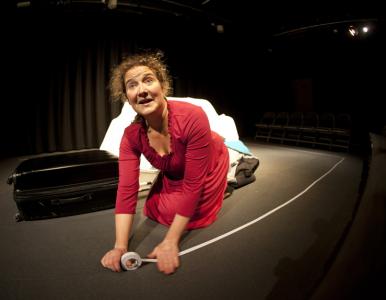
A powerful performance from Aliki Chapple, who engaged the audience throughout with her observations and digressions about the world. Sometimes light-hearted and happy but with some dark undertones, she shares a fascinating insight into the use of acronyms.
This is Aliki’s world, how she sees it and you are taken on a journey which at times is quite disjointed; what is it with the watermelon and wanting an earthquake? I was enthralled with this play sorting of knowing where it might be going but happy to be lead through the twists and turns. It made me smile, made me sad and was incredibly thought provoking.
It was a pleasure to see a performance that keeps you gripped for 90 minutes and still be thinking about it an hour later and I loved the music!
Sandra Cooper
A MIDSUMMER NIGHT'S DREAM - Uproot Theatre Company

Uproot Theatre are a company that likes to give a fresh take on established classics. This was billed as a play where two actors play the host of characters in this frenetic production. ‘The course of true love never did run smooth’, same could be said of this production!!!
Collecting my ticket I was told this was going to be a workshop performance, with scripts. Excellent! Seat of your pants theatre bring it on!
Richard Wiseman (the Artistic Director of Uproot Theatre Company) and Jamie Robertson took on the edited play with the aid of a coat stand from which they hung the various character costume items. Lysander and Demetrius had scarves with L and D on them, Helena and Hermia had hats with name labels on (well they were on for some of the time and the fell off and in the end Hermia was screwed up and thrown away!) Bottom had a donkey ear head band, and so on. The actors used these items and voices to distinguish between the characters. The costumes, at times proved tricky to put on and the accents wandered around a bit.
There were some lovely touches, the lovers snoring on the floor and I swear that I have never seen Titania played with an essence of Vicky Pollard before, that was quite a turn up! Scrumpy cider was used by the west-country accented mystical creatures of the forest as the juice from love in idleness.
It was an entertainingly shambolic piece. There is so much to the play that remembering which bit comes next is always a struggle…even with scripts. However the audience really warmed to the actors and their efforts and it is obvious they are brilliant performers just under rehearsed. As a member of the audience it felt good that at times you knew the next line when the actors didn’t!
Bonkers, and delightfully disorganised. I loved the way the actors looked palpably relieved when they got to the end. It was a great idea. I would love to see the finished product.
Jayne Marling
MR MERRICK, THE ELEPHANT MAN - Lucky Dog Theatre Productions

This production does exactly what it says on the tin. It is a factual account of Joseph Carey Merrick’s final years in the London Hospital Whitechapel. It does touch on the horror of the early life lead by this most famous of ‘freaks’ and there are some interesting interactive video footage to illustrate and add to the telling of the story. The soundtrack is all authentic Victorian recordings.
The cast, of whom there are two, put in a stellar performance. Tony Carpenter is superb as the afflicted Merrick. He must ache at the end of each performance from keeping the ‘frozen’ hand frozen, the limp, the curvature of the spine. No prosthetics and clever make up and yet we are not left in any doubt about the severity of his disfigurement. His delivery of the lines let us know his agony, his refinement and gentle soul.
Philip Hutchinson, the author of the piece, plays Treves, the doctor who ‘rescues’ the Elephant Man from the freak show and teats him with some degree of humanity. As time goes on we see a closeness developing between patient and doctor and that those who are able to have contact with Mr Merrick grow to like him and appreciate his gentle nature, despite what life has thrown at him. Only toward the end do we see any sense that he is angry and despairing of his plight. I have often felt that whilst Doctor Treves did take Mr Merrick from penury to some degree of comfort he only swapped his audience from the ignorant and poor to the ignorant and rich.
This is an informative and interesting piece, well written with some lovely touches. The performances are terrific and the use of the recordings and interactive videos make this well worth a visit.
Linda McAlinden
MURDER WEAPON - Dilate Theatre Company

Murder Weapon is an exciting and puzzling mystery that leaves you uncertain of who to trust right up to the end. A murder has been committed in a private residence, and Charley, standing over the body with a gun and with a previous murder conviction, is arrested on the spot and presumed guilty. He protests his innocence, however, and takes the police officers over his version of events, predominantly told in flashback, chronicling the build-up to the murder, and, indeed, the murder of his wife that he was sent to prison for. But is Charley telling the truth, or is he fabricating a story to incriminate someone else?
The young cast all delivered assured and mature performances without losing any of their youthful dynamism. Debbie Simpson was utterly convincing as the wry, straight-faced Chief Constable overseeing the Inspector, as played by Jacob Gilbourne, who provided tension in his eagerness to conclude the case immediately. Gilbourne’s best acting was with his facial expressions; he captured the cynical weariness of a middle-aged detective with his frowns and sighs over missing his golf. Zac Aimson, as Charley, captured the balance brilliantly between being an incompetent, naive, easily led ex-convict and a potentially dangerous and deluded fanatic. Ivan Kelly had to display the most diversity of character as he went from being a supremely confident psychiatrist to a man on the verge of suicide, but he always maintained charisma, and had a real watchable quality. Ellie Hibbert and Jack Kent, although in more supporting roles, provided moments of real energy throughout the performance. We were kept guessing to the end, which is in a way testament to the acting as an ensemble, as there were only ever really three suspects, but the actors consistently held the audience in suspense. They never faltered with their lines or seemed unsure of themselves, which shows the hard work they must have put into rehearsing. The costumes and set are also deserving of compliment, as they created a real professional aesthetic for the show. If you enjoy fine student drama and a puzzling murder mystery, then Murder Weapon is for you.
Rufus McAlister
A NASTY LITTLE PLAY - Chris Neville-Smith
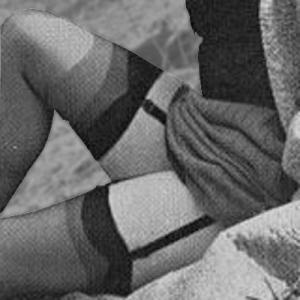
As you enter the theatre for A Nasty Little Play, you enter a Soho ‘bookshop’ in 1957, a place where men can come and peruse pictures of ‘stronger stuff’ than the shows performed by the burlesque dancers upstairs. There is a police raid, however, and with the threat of the press swarming about outside, the dignified gentlemen with prominent jobs in the city who are buying pictures are trapped, forced to sit and drink tea whilst making small-talk with the female performers and each other. In between the awkward silences, they cover a range of topics, from love to unrealised expectations to exploitation.
Primarily a comedy, A Nasty Little Play sometimes verges into darker, more serious territory. Raymond, a particularly sleazy customer, has a fetish for pictures that are clearly putting women into gross and exploitative situations, and he has his comeuppance when the others take issue with it. Jill and Miranda, two workers, discuss one of the women in a photograph, turning her from pornographic object into a person with aspirations and ambitions. Equally, there are moments of humour; the opening sequence with customers attempting to discretely acquire pictures of their favourite fetish before the shop manager loudly and brusquely presents them with envelopes of images was probably the funniest sequence of the play. There needed to be a little more happening onstage sometimes, as the audience’s attention began to wander in the silent pauses, but at 45 minutes long, it is short and sharp, and full of interest.
Rufus McAlister
OTHELLO: AN ALL-FEMALE PRODUCTION - Smooth Faced Gentlemen
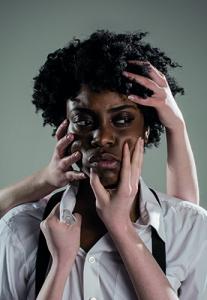
I had high expectations for this performance of Othello, as whilst this is the first production that I personally have seen by ‘Smooth Faced Gentlemen’, many members of the audience, whilst we waited to go in, enthused about returning due to the high quality performance of their last production – Titus Andronicus. And wow were my expectations exceeded! What a spectacular performance! From the onset the enthusiasm of the cast was evident, as we walked into the dimly lit (and very packed) theatre, the actors were there greeting the audience, immediately creating an intimate and engaging atmosphere.
Within moments of the performance starting we were gripped, Terri Reddin set the bar high from the onset with her fantastic portrayal of Brabantio; the dramatic yet fabulously humorous father who believes his daughter has been ‘stolen’ from him. Reddin’s expressive performance here had the whole audience laughing along – it was evident from the start that we were in for a treat.
Othello is a classic exploration of jealousy, revenge and betrayal; it sees complex themes of manipulation, broken trust and hate-fuelled as well as love-fuelled actions. With a relatively small cast of only eight, portraying such a variety of emotions (and in many cases portraying multiple characters at the same time) is undoubtedly a difficult task, yet the whole cast did so flawlessly – notably Sharon Singh who switched from the Senator to Montano to Bianca skilfully, even including a range of excellent accents!
What really made Othello such a fantastic performance was most definitely the actors themselves – the obvious hours of work that each and every one had undoubtedly put in has clearly paid off, the mastery of expression and emotion was consistent in every single line which again just emphasises the star quality that is Smooth Faced Gentlemen, everything from the directing to the lighting and the character changing to the character development was just done faultlessly. Ashlea Kaye, did a perfect job of portraying Iago – being convincingly calculating and manipulative one minute and then turning honest an innocent the next, likewise Anita-Joy Uwejah did a remarkable job of portraying Othello as the character progressed from love to doubt to revenge and beyond. The whole cast were able to create intense tension in the (many) high dramatic moments of ‘Othello’ whilst at the same time retaining a sparkle of humour – a huge well done to all.
A fast-paced, expressive and highly cohesive roller-coaster of emotion, this unique adaptation of Othello is unmissable – I can’t wait to see more from Smooth Faced Gentlemen!
Sarah Gunton
PEACEFUL by Polis Loizou - The Off-Off-Off-Broadway Company
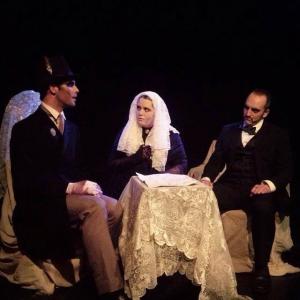
Peaceful is a tense, supernatural psychological horror. An elderly woman believes that a spirit near her house is closing in on her, eager for revenge after several decades. With the assistance of the contractor of her estate (her only real friend) and a spirit medium, she attempts to contact the malevolent ghost. Doing so, however, allows other spirits to interfere with the scene, and all three characters have memories they would prefer to remain buried. The horror is not created as much by what is seen and said, but by what is left unseen and unspoken; anticipation and tension are preferred to jumps and scares; it is written maturely and with intelligent restraint. The result is a creepy story that lingers longer in the mind than one which just looks to frighten.
The play held the audience’s nervy attention consistently throughout, and there were well-placed moments of comic relief throughout the sinister goings-on. The lack of resolutions, however, although mysterious, did not have full effect, since we did not really know enough about the haunting spirits’ actions when they had been alive to fully comprehend each character’s fear. For example, whilst the elderly woman’s father was clearly supposed to be uneasily enigmatic, we could not quite understand his behaviour, and perhaps that needed to be clearer for us to feel truly fearful. The opening scene had cleverly and concisely presented several areas where the plot might have developed without sounding like exposition, but these were left unresolved. Not knowing is scary, but it verged into not understanding, which was more confusing than terrifying. This did not ruin the experience, though, and indeed it is at its best when it feels like you are experiencing a dark intimacy in the séance, waiting for a shock. The actors’ performances were just right, measured but sinister, pitching the atmosphere perfectly. The audience was entranced and disturbed, and it remains a creepy play to see on a quiet night.
Rufus McAlister
PHONE WHORE (A ONE-ACT PLAY WITH FREQUENT INTERRUPTIONS) - Cameryn Moore/Little Black Book Productions

Watching a woman in her pyjamas gagging down her phone, you might be excused for thinking ‘Hang on, what am I doing here?’. You never find your mind wandering in Phone Whore, however, both because of the intensity of the show and because your thoughts are expertly directed through a myriad of connected topics: from sexual fantasies to societal taboos to eating cold toast. We are present for one evening in the living room/kitchen of ‘Larissa’, a phone worker played by Cameryn Moore. She describes her routine and her work as if we are guests, but when the phone rings we become voyeurs, listening to the increasingly surprising and taboo requests of her clients through her erotic stories, roles and sounds. Moore writes with some experience, a phone worker herself, and once a writer of personalised erotic fiction. Her story-telling ability, both on the phone as Larissa and the writing of the play as a whole, is admirable and enticing, her character vividly believable and likeable.
“You can’t argue with a turn-on,” she declares to the audience: “It’s not even real.”. And yet, in such an intensely personal setting, it could not feel more real. The physical stage repeatedly gives way to the imagination, the visceral descriptions of sexual fantasies are the real setting of this play. As an audience member you find yourself uncertain of how to react. Funny moments are interspersed between morbid revelations and frank discussion of work; you may be unsure whether it is acceptable to laugh, or if you should just cringe or sit stony-faced. When it comes to picturing the situations that Larissa describes, it is interesting to consider the psychology in seeing them either from a first or third-person perspective in the mind’s eye. Few performances can make you so consciously unsure of yourself, but Phone Whore does so with heaps of boldness and intelligence.
Larissa has fetishes of her own, and we get a brief glimpse at these. Unlike her clients, however, she is consciously able to address her unconscious desires, physically satisfy them and come to terms with them. Moore herself evidently holds strong opinions on the role of society in oppressing the unconscious, which she expresses directly to the audience. Occasionally her argument that phone sex is a positive outlet for closeted urges verges on diatribe, but it is certainly persuasive.
Perhaps Phone Whore’s greatest strength is Moore as a performer herself. Her charismatic assuredness allows the audience to feel instantly at ease – this is crucial before the often uneasy journey the play takes us on - and her movements and mannerisms are natural. She makes eye contact with her audience as she confesses her thoughts, and then shifts to become a new role every phone call. This is a very slick show, and gives great insight into the un-sexy realities of being a phone worker, though be warned that the vividness of the descriptions are startling and not for those who don’t like to feel periodically uncomfortable. Moore would probably argue that the unease is just social conditioning. I think I’d agree, but excuse me if I just stick to texting for a while.
Rufus McAlister
THE RATS IN THE WALLS - Alexander Arts
In looking for an adjective to describe the story of Alexander Arts’ supernatural horror, The Rats in the Walls, the word ‘Lovecraftian’ sprung to mind. Its description of unimaginable evil gods and enslaved humankind seemed reminiscent of the work of HP Lovecraft. Closer inspection tells me the play was adapted from a Lovecraft tale (there’s no mention in the promotional material) so there you have it!
Alexander Arts are a young company, who have taken the bones of Lovecraft’s narrative and condensed them into this short play (shorter than billed). It was sadly a nervous, insecure performance from all confirmed, with an improvisational quality that made it feel more like the preliminary sketch than a finished result. Perhaps the show would be helped if some of its elements (the World War I veteran, the period setting) were jettisoned, and the central theme of the subterranean civilisation retained and expanded upon so that a consistent atmosphere could be created. With source material so rich, there is certainly much for this company to work on.
Robbie Carnegie
THE RAVEN - Lady M Youth Theatre

High Peak author Michael Madden adapted this show from Edgar Alan Poe’s classic, gothic poem. He says ‘The Raven is such an evocative piece, very visual, which we have built on to include a vampire and a zombie, and of course the raven itself.’ The play tells the story of Poe as he reads his own poem; there are moments of comedy, gore and poignancy.
The audience was greeted as they arrived by a shock haired comedy Zombie (Alexandria Howerd) thrusting programmes at them whilst grunting “take!” On stage stood a large, detailed gothic coffin, a black table on which rested a carafe of deep red liquid and a lectern.
The vampire appeared, as a narrator figure impeccably accented by Ole Madden. His performance was played with full conviction both vocally and physically. He gave his character a real intensity. He tells the story of Poe and his decline.
Callum Webb as Poe had a consistent American accent. However, he never really sold himself as Poe. He needed to engage the audience as we watched his mental demise through the verses…he spoke the words but did not become the part. Maybe giving him more movement may have helped with the characterisation.
The Raven herself (Neve Robinson) looked amazing, her movements were wonderfully bird-like and the infamous “nevermore” was repeated with a sense of increasing satisfaction. I do think more direction was needed as she ended up repeating the same movements and walking the same route. The space was small and was further limited by the large set. Maybe a smaller coffin and the addition of a ladder to add some height as a perch may have eased the repetitive movements.
The support team did a marvellous job. Elliot Pickering added excellent effects with the light and sound and Hollie Crankshaw’s make-up was outstanding.
Overall The Raven was a good piece but, I think the play was uncertain as to its purpose. Stronger direction would help this young cast. There are some good moments and some excellent acting. This is a group with potential.
Jayne Marling
REDACTION - Shadow Syndicate

Set in the wake of the 7/7 London Bombings, ‘Redaction’ is a unique and thought-provoking portrayal of not only that singular, harrowing event, but on a wider level the fundamental questions that arise from such a rippling catastrophe. ‘Redaction’ goes beyond the expected ‘why?’ and ‘who?’ and delves deep into the concepts of truth and manipulation, whilst re-examining ideas of chance and coincidence.
Whilst the plot initially focuses on a single victim of the 7/7 bombings – Joe (Morris Findley), who consumed by both grief and a desperation for answers becomes fixated on conspiracy theories, we are also taken on an extremely intense journey into the dark and twisted depths of ‘redaction’. This is the idea that information is edited and influenced by a ‘greater’ controlling power, which when set against the backdrop of our ‘technology-led’ society not only makes this concept more chilling to see in performance, but illustrates the sheer innovation and relevance of this new writing.
With a small cast of only seven, I was apprehensive to how and if they could examine and explore such a complex range of themes – yet they did so skilfully. Morris Findley was exceptional in his portrayal of a grief stricken son and brother - his ability to illustrate layers of his character with flawless emotion and expression in such a fast paced performance is a show of true talent. Likewise, Marie Walker’s superb presentation of Scarlet, a power-driven and manipulative character was a central factor in the eerie and chilling feel to ‘Redaction’, that quite literally left goosebumps on our arms! What was truly spectacular about ‘Redaction’ was the range of characteristics and expressions covered by each character alongside the transformation of these characters – notably the sinister progression of Alex Brown’s character, an influential and greed-driven politician, which was truly gripping to watch.
Shadow Syndicate shined with talent this afternoon, each and every member of the cast was spectacular in their performance – energetic, expressive and fully engaging. Dramatic techniques were used to great effect – cross cutting, thought tracking and freeze frames along with the visual representation of deception not only made the performance fresh and exciting, but allowed the scale of the ideas explored to be presented in a modern and original way. Furthermore the fact that this young cast both wrote and performed this innovative, theme-packed production just highlights their talent further.
‘Redaction’ is a slowly unfolding winding web of questions and corruption that will take you on a journey of emotion – deception is paralleled against trust and manipulation and control are used against a backdrop of faded morals as the characters frantically try to distinguish (and blur) the lines between fact and fiction in the race against Joe’s search for truth and answers. This is a show that will leave you contemplating and questioning these very concepts long after it has ended – I highly recommend.
Sarah Gunton
SAFE MODE - Theatre By Numbers
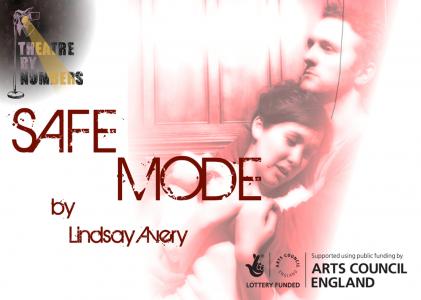
‘Safe Mode’ is a fantastic piece of new writing by Lindsay Avery – set in a futuristic world the play centres on sole survivor Mia as she embarks on a journey of self realisation and in the process finds her life up-turned by a super friendly, yet fabulously humorous android.
I was gripped from start to finish; it is undoubtedly a difficult task to portray the range of expression needed in such an emotion-rich story line, yet the two actors did so flawlessly. Rebecca Derrick was outstanding in her portrayal of a traumatised survivor seeking safety and protection whilst still haunted by the prospect of facing up to reality. Likewise, Nathan Morris was exceptional in his portrayal of the lonely and naive, yet loveable, Bentley.
As the play only contained the two characters, it was very dialogue oriented; yet this just contributed to the already powerful chemistry between the actors and led to an in-depth exploration into the layers within each character’s journey. The formation of trust and friendship paralleled against the ultimate theme of acceptance and ‘moving on’ was executed brilliantly and was an integral to our (in some cases very emotional) reception to the performance. This said, though centred on dialogue, the use of lighting, props and setting were all used to spectacular effect and contributed to the engagement of the play. I particularly liked the use of the silhouette screen and the incorporation of story telling which worked naturally alongside the core themes of escapism and the bridge between fantasy, ideals and reality.
Though influenced by other popular works within the sci-fi genre, such as ‘Artificial Intelligence’ and ‘Dr Who’, ‘Safe Mode’ is a unique exploration of character development and very raw, real emotions such as loss, escapism and sacrifice juxtaposed against elements of fantasy and surrealism. I was really impressed at the complexity of this performance; the ability for wit and humour to be woven in whilst such intense themes were being explored is a show of true talent in both the writing and acting.
This innovative and highly moving exploration of survival and sacrifice will leave you laughing one minute and render you close to tears the next – I highly recommend.
Sarah Gunton
SERIOUSLY FUNNY - Dreamshed Theatre

United Reformed Church - Blue Room
14th July (further shows 15-17th July).
In their own very different ways Tony Hancock (Iain Barton) and Kenneth Williams (Wink Taylor) are much loved pillars of post-war British comedy. Seriously Funny draws on those differences to great effect whilst, ultimately, suggesting that the pair had much more in common than they realised.
The basic story is well-known. In the early 1950s Hancock's Half Hour was a great success on the radio (or the 'wireless' as many would have called it). Kenneth Williams was recruited to add some characters as a foil to Hancock's would-be suburban intellectual. Williams - thanks to some catch phrases and over-the-top camp delivery - soon caught the public imagination.
In time the pair fell out: Hancock's jealousy and alcoholism played a part as did some philosophical disagreements. Hancock thought of himself as a rationalist and struggled to see the point of life. Williams had faith in a supreme being. Williams thought that their work together had validity and mattered; Hancock worried that they were wasting their talents on frivolous nonsense. Hancock's career rapidly declined - in part with the advent of TV, but also because of his depression and poor choice of work projects.
By the end of his life Williams, racked, with pain also questioned his career choices. The Carry On films may have become a national institution but with each film they became more repetitive, formulaic and less fun. At the end Williams too wonders if life is just a joke.
If this sounds a little gloomy - serious, even - rest assured that you will be laughing out loud from start to finish in this hour-long show which zips along with energy. Barton and Taylor are persuasive and plausible throughout; the script draws extensively on the original Hancock sketches - and no matter if you know the punchlines, you'll still laugh. The timing is spot-on and the little bit of audience engagement is good-natured and never threatening.
The United Reformed Church Blue Room (capacity about 25) makes a perfect venue for this intimate show in what is another triumph for Dreamshed Theatre.
Keith Savage
SKIMMING THE STONES - Tilly Mint Theatre

Skimming the Stones is a new piece of new writing. It’s a monologue, told by a woman explaining her relationship with her parents, her boyfriends and herself.
Can Alison escape her past and be happy and believe in herself? Sometimes we are in a place and it seems like we are trapped and can never escape. If we run, what would be the point? Your troubles would follow you, sometimes you have to make small changes in order to break free and gain confidence.
Angela Buttrill develops the character of Alison from the lonely lady who is dominated by her mother to a squash playing woman beginning to find herself through the small changes she makes in her life.
The piece is simply staged, with small changes to costume to show Alison’s developing character.
A gentle, thoughtful piece.
Jayne Marling
SLUT (R)EVOLUTION: NO ONE GETS THERE OVERNIGHT - Cameryn Moore/Little Black Book Productions

Cameryn Moore is always a delight to be in a room with. A fear, I think, of many fringe goers, is that the acts may not be entirely polished, or a little shaky. This could not be said about the one woman behind ‘slut (r)evolution’. It is obvious she is very well versed in what she is doing. She has done this before and she is a professional. For an hour Underground, she takes the audience through a journey in her sexual awakening, set in a coffee shop where the audience is her date. Monologues are interspersed with scenes from Moore’s past, where she interacts with those she speaks about in a much more honest way.
It is fascinating to watch her transition between her cocky, confident, coffee shop character, into the slightly more nervous, more confused, characters of her past. There’s a slight change of movement, a soft touch of lighting, and then it becomes clear from her manner that this is a very different person to who she is now. Each version of herself holds a very strong image, moving though her youth, travels to Russia, and on to events a little more recent.
It is very refreshing, cathartic, if you will, to watch someone so frank and honest about female sexuality, which does often get a little overlooked or misinterpreted in modern society. ‘slut (r)evolution’ has nothing to hide, and that is largely what makes this play so enjoyable. The complete openness that Moore has with her audience is beautiful, and one can’t help but feel ‘in the club’ while watching her.
It should be noted that Moore’s work is possibly not for the faint of heart. ‘slut (r)evolution’ is certainly not as “hard core in your face” as the second play she is performing at this year’s Buxton fringe ‘Phone Whore’, but although there is no actual nudity, the imaginary nudity really is something to behold. Possibly not something to take the grandkids, or your mum to. For those who wish for a slightly more risqué fringe evening, you can’t go too far wrong than by being chatted up by Moore’s characters for an hour. Take a gin and relax (there is no audience participation, if you were wondering).
Ariane Dean
THE SMALL THINGS - Two Yolks Theatre
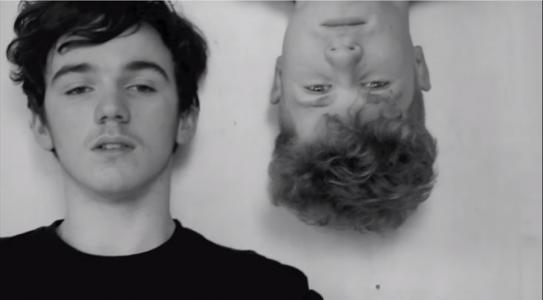
This is a really engaging, moving and innovative “devised piece” of theatre which incorporates film, dance, acting and live music all in the wonderfully atmospheric, but rather confined, space of Scrivener’s Bookshop. An impressive feat for this newly formed company of three 16 year olds from Manchester: Johnny, Matthew and Rachel who are fresh from taking their GCSEs.
To an audience of about 12 adults, “The Small Things” started on the top floor of the bookshop, with a recording of voices while the two acting members of the company, Rachel and Matthew, browsed silently among the books. At this point, we were not even sure they were part of the cast or quite when the show actually started. It was certainly intriguing, even more so when they started by projecting a short film onto the wall, accompanied by music. This quickly established, through choreographed, stylised movement, a close, happy relationship between two teenage brothers, Brendan and Peter.
It soon becomes apparent that the young men have run away and crashed their car. Brendan is dead and gone to heaven, according to Jessica, Peter’s angel. She has been sent to help Peter get through Purgatory (the bookshop – a wonderful touch) using ideas from a book about grief. The loss of Brendan is compounded by Peter’s feelings of guilt that he killed his brother.
A floor down, in the Poetry Section, Peter is lulled to sleep leaning over a white piano by his angel singing him a lullaby. This was one of the highlights for me – a deeply moving, original song played (I think) on a Yukele and sung beautifully by Rachel.
On the next floor down, Jessica talks about the need for honesty when grieving, “Tell yourself your truths,” she advises Peter and they “dance” together – a series synchronised, simple movements on the sofa, to recorded music. Peter (played by Matthew who is clearly a trained dancer) also performs solo on the frame of a chair – a slightly heart-stopping moment for the audience, given their proximity!
This new company is certainly one to watch. They clearly have a lot of talent. A difficult subject matter was explored in a really original, sensitive way – with considerable skill and maturity given their youth – and with an interesting ‘twist’ at the end. There were some technical issues caused by the performance space, for example, it wasn’t easy to see the film at the start because the room was too light and also the audience were not sure where to stand or quite when to move despite recorded ‘beeps.’ At one point, people naturally sat on the sofa (after standing) and had to be asked to move by the performers. However, these are only “small things” that can be ironed out. Overall, it was really engaging and memorable: a lot packed into 40 minutes well-spent. Well done and thank you.
Karey Lucas-Hughes
(The short film called “Brotherly Love” can be watched on You Tube.)
TES - TESS OF THE D'URBERVILLES RE-IMAGINED - Steve Larkin

The Fringe may be in its final days but its theatre thrills are far from over with exciting new productions still showing up.
Writer/performer Steve Larkin cleverly retells the story of Hardy’s tragic novel for the modern age, creating something of the atmosphere of Ken Loach’s northern coming-of-age film, Kes. Instead of a heroine we have Kes, a teenaged boy from a Newcastle council estate growing up in the early part of this century. Things seem stacked against him – his father is a drinker, his best friend involved in crack gangs. The discovery that he is descended from the poet Byron appears to be a piece of good news – “I cannae believe it – I’m as giddy as a kipper”, says his mother – but in fact it only serves to make him fatally fascinating to a predatory female teacher, Alice Prycer-Fox. I wouldn’t want to give too much away but what happens to him subsequently (an explicit but beautifully written scene) affects his entire life with the second half exploring his relationship with Clare from Office Angels and his career as a performance poet after he has reinvented and renamed himself as Tes, hoping against hope that his past will stay in the past.
Larkin is a poet and I believe the technical term for this kind of show is spoken word theatre, but what it felt like to me was the very best kind of involving story-telling. Here is someone who can act all the different parts as required; his portrayal of the boy’s father is particularly fine but he is not fazed by female characters and also manages to portray conversations between different people without it looking clunky on stage. Thanks to his versatility and eloquence, there is great clarity to it all; no-one need worry about sitting through the play in a fog of incomprehension. And though ultimately tragic, there is also plenty of humour. In a strange way, the tragi-comic tone, the class consciousness and the accurate depiction of how our lives are shaped by the society in which we live reminded me of the artist Grayson Perry’s modern tapestries The Vanity of Small Differences, inspired by The Rake’s Progress.
Kes’s transformation into a performance poet adds another dimension as we are treated to examples of his witty slam poetry. For me some of the longer poems interrupted the flow of the story-telling a little but they were still worth hearing in their own right and the production’s free verse and word play throughout are enhancing rather than distracting. It is also worth mentioning the production’s unobtrusive soundtrack which sets each scene without ever stealing the show.
If you’ve read Hardy’s Tess, or even read a plot synopsis, you will get more out of the story’s reinvention, but Tes also stands alone as a hard-hitting drama for our times and well worth catching if you can.
Stephanie Billen
TITUS ANDRONICUS by William Shakespeare - Smooth Faced Gentlemen

Titus Andronicus is given a slick and stylised interpretation by a young, talented all-female cast. The play itself is one of Shakespeare’s underrated gems, a mixture of bloodthirsty violence and cruelty with memorable characters and poetic brilliance. The actors clearly appreciated the language and its meaning, giving them the confidence to boldly take on the physical and emotional rigours of the play. The scenes of physical brutality were handled well and without hesitation; swords and daggers are replaced with paintbrushes which leave streaks of red paint on the victims. It would be easy to slip into overacting as the violence increases and the body-count rises, but to their credit the actors always played their parts with a reassuring restraint and maturity beyond their years. Between scenes, the cast would sing just offstage in a beautiful but sinister harmony; this was one of the strengths of the all-female dynamic, as it created a dooming siren song. The absence of male actors never stood out as an issue, such was the capability of the cast to cover the spectrum of gender. It seems unfair to single out any one member, as they had such collective strength, but I was particularly impressed by the nuanced characterisation of Lavinia and the quirky and original interpretation of Aaron.
The direction was superb, and elevated the performance into a very professional spectacle indeed. The movement of actors around, above and through the set gave the audience an interesting and constantly shifting perspective, and there were constant moments of creative brilliance; the use of backlighting to create silhouettes for the pit and the appearance of Revenge was a highlight. The set itself was intriguing, both superficially a bland and imposing set of walls and yet quickly given character. The actors handled its movements perfectly, and have evidently worked hard on the technical aspects of performance.
Clearly a big editing job had to have been done to fit the one and a quarter hour running time, and some parts of scenes had notably been cut, but the intensity of the performance worked in its favour. Perhaps the ending wasn’t quite in keeping with the rest of the show, but I can’t identify any real flaws in the production. It was a joy to watch, if that is possible for Shakespeare’s most bloody tragedy.
Rufus McAlister
TO SHE OR NOT TO SHE - Joue Le Genre/Emma Bentley

This is a one woman show, performed by Emma Bentley, which she also wrote, with support of a co-writer, Holly Robinson. It felt like a personal journey through her love and knowledge of Shakespeare, determination to act and frustration at the gender divide that still exists in theatre. We are generally familiar that at the original time of performance female roles would have been taken by men or boys – which goes some way to explaining the lack of women in Shakespeare plays. And most of the ‘great’ parts and speeches are written for the male characters (there are of course some wonderful female roles and speeches, but it is an uneven balance). As an actress therefore, it can be frustrating when you can feel or be excluded from the greater proportion of roles.
While she didn’t quite take us through the seven ages of Emma, we did spend time with distinct periods of her life to date – with a short coda to bring us up to date. Covering a time span of some 9 years we are shown three distinct periods of Emma’s acting career – school, drama school and professional. I felt the middle age was the weaker segment, possibly as it was least connected to the central theme of Shakespeare and found the 14 year old Emma at the beginning the most enjoyable. 14 year old Emma is desperate to play Hamlet – and she is the best actor in the school – so surely the role is hers…
As the audience arrived, Emma was sat on the floor, playing with her trump cards. This helped set the scene for the audience, and it was clear when she moved to performance and play started. I felt the ‘real’ phone call jarred; breaking the fourth wall in a way that didn’t match the rest of the delivery to the audience. I also felt the speech about why Bentley had written the play, although personal and warmly done, wasn’t necessary and could be covered in programme notes. The end could benefit from a little polish; partly as there seemed to be several ‘ends’ making it unclear from an audience perspective when it had really finished. Leaving the stage at the end of the final bow would be an option!
Her enactment of Olivier, was accompanied by some very animated eye-brows and this echoed her whole performance – which was also lively, humorous, engaging and heart-felt. Her final delivery was full of fire, passion and emotion. Bentley confidently took on the role of numerous characters to tell her story, and used voice, movement and direction well to help us identify who they were.
An overheard comment from another audience member seems to sum it up: “that was worth seeing.” And while there are plenty of references to Shakespeare and quotes, if you’re not familiar with the Bard’s work, you won’t lose anything from “To She Or Not To She.”
Maria Bennett
�
TOGETHER IN ELECTRIC DREAMS - Scytheplays Ltd
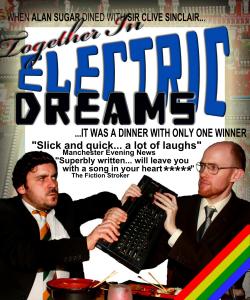
In 1986, his company brought to bankruptcy by the epic folly of his C5 vehicle, visionary inventor Sir Clive Sinclair was forced to sell his ideas and patents to arch-entrepreneur Alan Sugar, to be mass-produced by Sugar’s Amstrad company. In a witty and clever When Alan Met Clive … scenario, Together in Electric Dreams brings these two figures together in a Japanese restaurant to iron out the details of the deal.
Daniel Thackeray, both as writer and actor, imbues Sinclair with a slightly other-worldly quality, fascinated by elegance of design, but utterly wrong-footed by the arch-wheeler-dealer Sugar, played with wide-boy ebullience by Steve Cain in a curly wig. Their culture clash is at the heart of this enjoyable, broad-brush rendition of 80s invention, which presses all the right buttons to those of a certain age nostalgic for computers run by cassettes (the montage of ads at the start is a delight!) but also (for a younger audience) a window into an earlier chapter in the life of Lord Sugar.
The play slightly lost energy towards the end, and could definitely do with a bigger table (both actors struggled at times with food, briefcases, mobile phones, microphones etc) but this was a highly entertaining piece of writing, well played throughout.
Robbie Carnegie
TROUBLESOME PEOPLE by Jill Haas - Ashrow Theatre

United Reform Church. 22 to 26 July 2015
The internment of British Conscientious objectors is not a subject much talked about but this production takes us straight into a tribunal where Sam Bankes is explaining his stance and why he will not be joining ‘your war effort’. The result of this is that he and his wife, Honey, whilst not sent to prison, are exiled and interred on the Isle of Man for the duration.
The Isle of Man was used as a ‘holding’ cell for ‘conchies’ and Germans who were either resident in Britain at the time of the outbreak of World War 2, who sought refuge from the Nazis or who came over on the ‘kinder trains’, usually Jewish they were categorised to assess their threat to national security and detained accordingly. Some were allowed to work on local farms to replace labour fighting for the allies.
The story takes place on one such farm. As each of the characters are introduced to us they are immediately identifiable. Each are clearly drawn and well defined as we view a ‘year in the life’ as they get to know each other and try and break down barriers and adjust to a life they had not really planned on living.
There is the hostile and resistant Doreen Humber who owns and runs the farm, her down trodden and compliant husband Ossie. Sam and Honey are already living and working there, having lost their jobs and exiled from London. Doreen is struggling to understand their point of view, surely it is everyone’s duty to ‘fight’, but seems to enjoy the company of the thoughtful and reasonable Honey.
Mrs Stanton, who’s job it is to place these interns, asks Doreen and Ossie to accommodate and give a job to Leo, who came on one of the Kinder trains and Jewess, Frau Leni Hirchon a professor of English, we see Doreen’s fear of having these ‘foreigners’ on her farm and how she treats them with disdain and her jealousy as Honey and Leni become close friends. By planting the seeds of doubt in Honey’s mind about Sam’s feelings for Leni, we see how this stirs up trouble and alienates the workforce. But all is not as it seems within the Humber household either!
The writing is excellent, the characters and their status are very quickly established. There is humour and sadness, and we get an insight into how the war affected not just those who fought on the front line but also those who were left behind or displaced. During war or peace, people are people and the age old emotions of love, fear of the unknown, jealousy are prevalent and may be exacerbated by circumstances.
Imagination is required to put on production in this venue as you are limited for space and there is no chance for any scene changes. These obstacles are overcome and the set is terrific and used to great effect. The props and costume are authentic.
The acting is superb. A fabulous ensemble piece, well researched, written and performed. I really enjoyed this production and would encourage everyone to go along to see this great human drama.
Thank you.
Linda McAlinden
THE TURN OF THE SCREW by Henry James (Adapted by Martin Prest) - That's My Cue Productions

The Turn Of The Screw is an ambitious interpretation of Henry James’ novella, performed by two actors in a technically demanding production. Set in a country estate, a young governess looks after two children. She starts to see figures patrolling the grounds, however, and, after discovering that they are ghostly apparitions, worries that they have come to take the children. But how much is real, and how much is in her head? Whilst the novella leaves this ambiguous, That’s My Cue Productions certainly seem to come down heavier on one side. If this sounds like a criticism, it is not, and indeed the part of the governess was played strongly and convincingly; her character’s progression was coherent and well-portrayed.
The show has a number of technical elements, and these were handled well and to good effect. The children were represented as puppets, which worked well with the uncertainty of the story and the potential manipulation of words and reliability of narrative. Despite being blank-faced dolls, they never had a jarring effect, and the dialogue was structured well to compensate for their lack of voice, without sounding awkward. There were a number of sound and lighting cues, which broke the play up, as if into moments of fading consciousness or vague memory. The most technical aspect, however, was probably the rapid changing of costume by one actor, who went from being different ghosts to the scullery maid to the uncle and guardian of the children to controlling the puppet-children. In a demanding and often frantic changing of roles, he handled the rigours of the performance confidently and successfully. Whilst The Turn Of The Screw could perhaps benefit from cutting some plot events in order to make the ghost scenes slightly longer and creepier, it is still a creative and chilling production.
Rufus McAlister
TWO by Jim Cartwright - Sudden Impulse Theatre Company
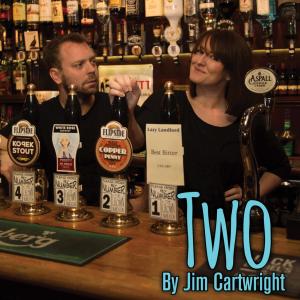
Sudden Impulse Theatre Company’s production of Jim Cartwright’s Two is a delight; a wonderful mixture of comedy and tragedy, performed brilliantly by Kay Sanders and Phil Malkin. Set down in the local, Sanders and Malkin play the landlord and landlady, as well as all the other patrons. Through the snippets of their lives, we are exposed to the full range of English society; the old, fat couple who discuss an extra in a film on the TV, the elderly lady who leaves her bed-bound husband for a drink each night - trapped in her routine by circumstance and lack of money, the couple where domestic violence is constantly brimming, and the pub owners themselves, haunted by events seven years ago, unable to reconcile with one another. With such a demanding variety of roles, weaker actors might struggle to portray the characters convincingly, but Sanders and Malkin manage this expertly, capturing the tone of each scene each time. Sometimes it is funny, sometimes uneasy and always a poignant reflection on life and its challenges and disappointments.
The set is quite simple, comprised of bare, undecorated tables, chairs and bar, and yet the rich atmosphere created by both the quality of the play and the performances bring the pub to life. The ability of the actors to play the comedy in one scene and in the next scene switch to darker, more serious characters was commendable. The direction was also strong, as there was a relatively small space to move about in, and yet in the younger characters there was a real dynamism that never left the audience uninterested. Two as a play is very strong itself, and the actors clearly enjoy and profit from having such an original text to work with, but this is not to demean their accomplishment. It was sold out when I saw it, so it may be worth getting a ticket early to make sure you catch this exciting piece of theatre.
Rufus McAlister
UGLY by Lilly Posnett - Orange and Pip Theatre

The Brothers Grimm’s fairy tales, as we are often reminded, are very far from the sanitised Disney renditions that we’ve all grown up with. Lily Posnett’s play, Ugly reminds of this fact, taking a feminist spin on the characters of Cinderella and her sisters with Cinderella (Posnett herself) a sunny-natured soul simply wanting to bring happiness to her maimed and blinded sisters Drizella (Poppy Forshaw-Perring) and Anastasia (Annie Osborne) by arranging unsuitable marriages for them. At the same time, Cinderella is now removed from the life at one with nature that she loved, a virtual prisoner of her husband, the Prince.
To some extent, this is a narrative seam that has been well mined previously, whether in the stories of Angela Carter or Sondheim’s Into The Woods. ‘Happy ever after,’ as we’re often reminded, might not be as happy as it’s made out to be. In Ugly, all three actors perform with commitment and clarity, their physical theatre moments (illustrating other fairy tales) were well conceived, and Posnett’s writing displays a good use of imagery. I did feel however, that the piece needed more of an external director’s eye, just to tighten up the ideas that were there, and to make the concepts and execution crisper. The coda with the three sisters having escaped their palatial confines especially needed attention. Nonetheless, this was an enjoyable and thoughtful entry from a company full of ideas.
Robbie Carnegie
THE UNFURLING OF INDIGO HIGGINS - Arletty Theatre
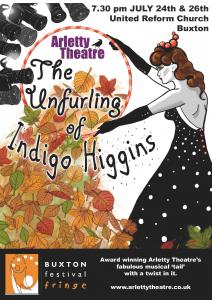
Following their success with last year's award-winning Swan Canaries, Arletty Theatre return with an engaging new musical. 'The Unfurling of Indigo Higgins' is not only a sparkling and intriguing story, but also brings an important message about the need for body positivity in today's media dominated society.
The cast of three effectively uses interesting props and sets to create a contemporary fairytale feel through woodland aesthetics, shadow puppetry and physical theatre. The Ramshackle Crew (Daniel Webber and Kitty Randle) bring magic and the moral to the story. Poor model/skivvy 'Flea' is ingeniously brought to life by Kitty Randle - a captivating performer who moves beautifully. Her funny but tragic first song was very touching: Flea "hasn't eaten since Wednesday". The career she chose over starting a family was meant to "set her free", but instead has her trapped "obsessively counting calories". Although played for laughs, the concepts behind this number were sinister.
Through the character of Indigo Higgins (Imogen Joyce) we learn how imposing beauty standards on children can have a devastating effect on them later. The fashionista (once oyster, now pearl) dreams of applause, and is spurred on by the harsh words from her father to ruthlessly make her way to the top. Joyce has a superb singing voice, bringing strength to the musical numbers.
The messages of the production are "Fashions don't last forever/ you should learn to value the fact that you're clever" and "Why let others decide how you should feel". Joyce (also writer and director) wrote this musical after working with children and realising people as young as seven are starting to suffer from eating disorders, and worry about their appearance. The musical tackles important, heavy issues in a fun, exciting way.
I feel that this production would be more suited as a 'For Families' show (or a theatre in education piece) with its simple but important message, particularly applicable to young girls. Ironing out some first night stumbles would polish the production. This is an energetic, inventive performance from a talented cast. Catch it again July 25th at St Peter's Centre, Mansfield, and back in the United Reformed Church, Buxton, on the 26th.
Annie Osborne
VOICES FROM THE FOREST - Dreamshed Theatre

Voices From the Forest is a thoughtful and well-researched project about the Dymock poets, set in a modern bookshop as people come to read their work and share their opinions with the audience. Whilst the play covers all the poets, the focus is primarily on the lesser-known ones; Robert Frost and Edward Thomas do not get as full a treatment as their colleagues. This allows the various characters entering the bookshop to explore ideas about fame and interpretation, the immortality of words and their effects in later years. It is not complicated or edgy, but a well-written, well-presented show, with constant readings of the poets’ works adding a lyrical beauty.
The acting was strong throughout. The disgruntled lecturer present to deliver a talk on Frost was performed with excellent comic timing and charisma; it was a strong opening to the show. The Essex student who wants to tread the ground that John Drinkwater walked upon without getting muddy was very well observed and played to humorous effect, whilst subtly raising the question of the importance of place in writing. The finest performance, however, was probably that of the meek bookshop owner, moved by Lascelles Abercrombie’s works; this was a very sensitive and understated portrayal. Performed in a small space, Voices From the Forest feels highly personal and homely, and the slightly subdued atmosphere counts in its favour, as it adds to the bookshop feel. It is both a pleasant and informative show, with a selection of poetry that will inspire you to read this great collection of writers.
Rufus McAlister
WAR OF THE WORLDS - Uproot Theatre Company

Captivating from the outset, this one-man adaptation of the well known novel was unique and absorbing, giving the audience a full insight into the turmoil and horror of the world during and after an unforeseen Martian attack. There is no doubt that this rendition of H.G. Wells' novel is excellently and cleverly adapted to provide outstanding entertainment.
The story was confidently delivered without fault or hesitation. This was an utterly assured, flawless and passionate performance, causing tension to build by never giving too much away whilst consistently allowing the audience to fully grasp the essence of the story being told. Despite this being a one man show, the stage at no point felt bare or lacking; the delivery was invariably gripping, entirely filling the stage and making any other participation unnecessary.
The minimalist set allowed full focus on the engrossing story, whilst the inclusion of few vital props permitted the audience a small but detailed glimpse into the world outside of the small room in which the play is set; the abundant details within the story painted a vivid picture of the horror and fear being described without need of an abundance of visual evidence. Similarly, few unsettling sound effects included throughout further convinced us that we were stuck in this post-apocalyptic world alongside our brave protagonist.
Anyone looking for an engaging and exhilarating piece of theatre with an alternative and refreshing style would do well to choose this play.
Sarah Lowes
WOMEN OF THE MOURNING FIELDS - Aulos Productions

Women of the Mourning Fields is very strong all round. The youthful cast give an air of professional calmness in their performances, the direction was sound, and costumes and props were used sparingly and to good effect. The greatest strength of the production, however, is the play itself, which is brimming with ideas and shifts from comedy to tragedy and different storylines, depending on who tells the story. The play takes Agrippina, Poppaea and Octavia, three important women in Nero’s Rome, and shows them as actors who must perform to the emperor’s whim. When he leaves the theatre, however, they truly come to life, and wish to be the writers of the play, rather than acting the events of their lives as described by Nero. Whenever a character holds the pen, it is their narrative that is performed, whether it is the dominating Agrippina, the sassy Poppaea or the meek Octavia.
The play raises a myriad of questions, many of which are never resolved, which is the mark of a confident and highly capable writer. It is a play about both the personal and the abstract. The domestic is examined, with Agrippina and her sisters trapped with her incestuous brother Caligula, Octavia wishing Nero could requite her love and Poppaea mourning her child’s death. This is all set in the framework of questions about how we view history as narratives, the role of meta-theatricality, and whether the voice of the writer or the historian can ever capture the true voice of the historical character. The ‘big questions’ are asked, but never at the expense of the microcosmic character development.
The play’s intelligence may ultimately count against it, as at times it can be hard to follow unless you have a good knowledge of Rome in the time of Caligula and Nero. That being said, it is never bogged down with historical detail, and indeed all of the actors’ sensitivity to their characters, even the more minor parts, was highly commendable. Occasionally it was slightly too technically demanding, with the lighting trying to keep up with the constant changes of scene, but it didn’t really affect the audience’s enjoyment. A play about telling the right story, this is a superb story itself.
Rufus McAlister
WOMEN WHO WANK - FoolSize Theatre

This one woman show is unquestionably for someone with an open mind towards humour and sexual activity. The phrase “an acquired taste” definitely sprung to mind throughout the performance. Personally I enjoyed this piece of improvised comical theatre, the quick wit and interactional humour was a delight.
To be brutally honest, for the first 20-30 minutes I definitely thought to myself (and to quote the actress herself) “What the hell have I got myself in to”. Uncomfortable and awkward, I sat there hoping that this woman would never speak to me. However after taunting me and my boyfriend, creating a hysterical sketch of us displaying provocative gestures over a brew and some biscuits, I surrendered to her comedic charm. Tremarco is a quick comedian who’s quirky, humble being creates inventive theatre.
“Acquired taste” sprung to mind when Tremarco used her dress as an adaptable Vagina costume. Although many in the audience found this entertaining, some did not. This off-the-wall (slightly immature) humour is not to my taste, I felt it was slightly forced, however some of the audience members would disagree with me. This was also the case with the audience participation. Some audience members were certainly uncomfortable with the interaction, I feel this is a huge part in choosing to go to certain performances and it would be advisable that it should be added to the description, as it is a major part of the actual act. In contrast most of the audience were enticed in the participation and enjoyed the ‘banter’ between cast and audience. I certainly felt more comfortable after encountering the participation, it made me relax and enjoy the awkward, embarrassing humour we were all discussing.
Tremarco is a fantastic actress, in many parts I felt the more serious aspects of the piece were the highlights. For example the touching (pardon the pun) story about her mother was a wonderful snippet of more “serious theatre”. I was utterly engrossed in her story telling and felt this was a beautiful ending to the comedy.
As a 17 year old, I did enjoy this piece of theatre, there were audience members of my age, double my age and triple my age in the audience, which made this piece of theatre diverse and intriguing. If you are an open-minded comedy/theatre goer, who doesn’t mind audience participation, consider a night of discussion and improvisation, based around “Women who Wank”.
Eleanor Hibbert
WRITE YOURSELF FREE: FEMALE FACTS OR MALE FICTION? - Dolls House
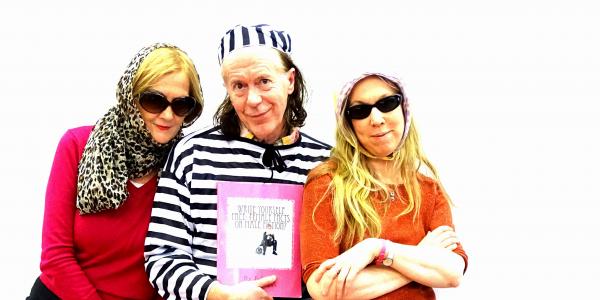
Doll's House and writer Alan Charnley's offering in this year's Fringe is a story about damage, blame and revenge. The action takes place in a contemporary setting but these are themes which have been played out in theatre since the time of Aeschylus.
The work starts out lightly enough with Felix (Alan Charnley) planning and scheming on how to achieve that much-prized status – celebrity! His helper in this venture is his quiet-spoken and seemingly happy wife of 20yrs Jill (Nici Preston). Felix needs to write something, not just anything and something more than his trivial copy for provincial newspapers. What he needs is a blockbusting best-seller. To to this he thinks, he needs isolation. It is this which ultimately leads to his undoing.
On being freed of Felix's attention Jill and media producer Belinda (Joanna Lavelle) who was 'bought on board' to produce a TV show strike up a relationship which grows into something rather more than product development.
If it hadn't already been used by Mike Leigh, then 'Secrets and Lies' would have been an apt title for this play. For in it we learn of dark deeds, damage and denial. Indeed, we might think that all the characters are damaged for there are signs that this is so, but they are not explored. What emerges is the empowerment of the victim which results in . . . well you decide – is it justice or revenge?
All the players turn in solid performances and it certainly gave the audience food for thought. Dark, yes. Disturbing, possibly. Sensitive issues dealt with appropriately, yes. Not for everyone, but perhaps more should see it. The next show is on July 22nd.
Ian Parker Heath